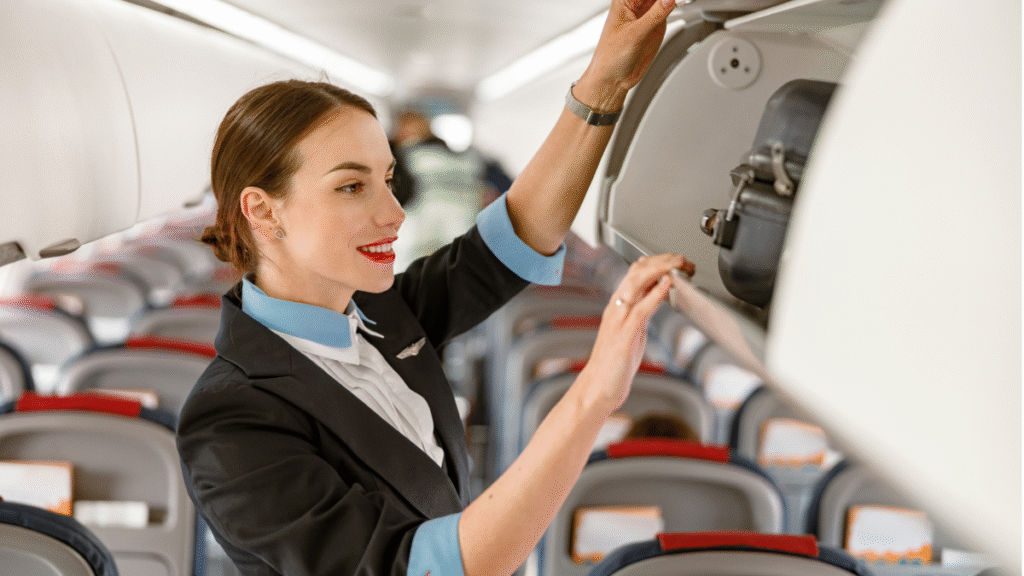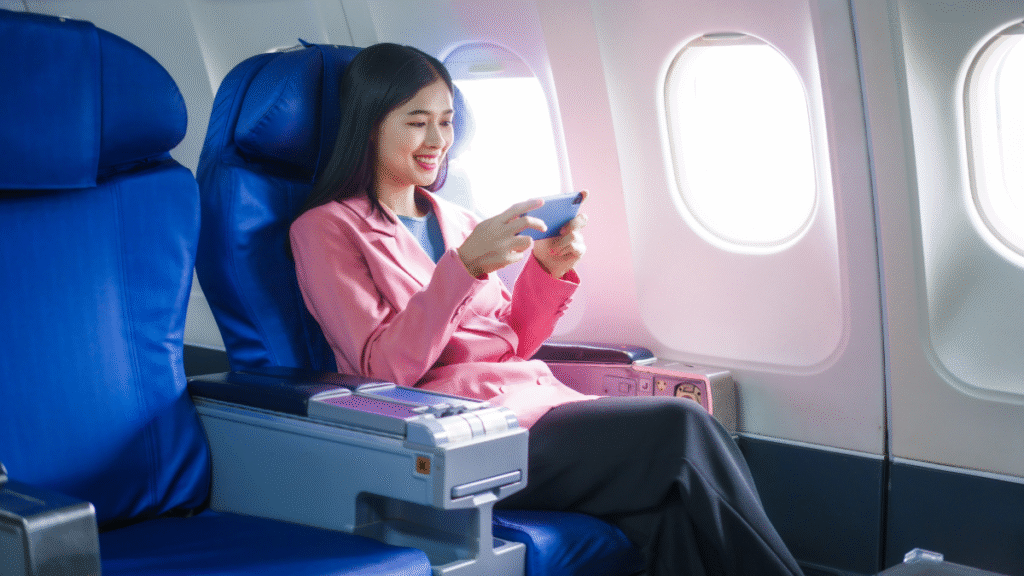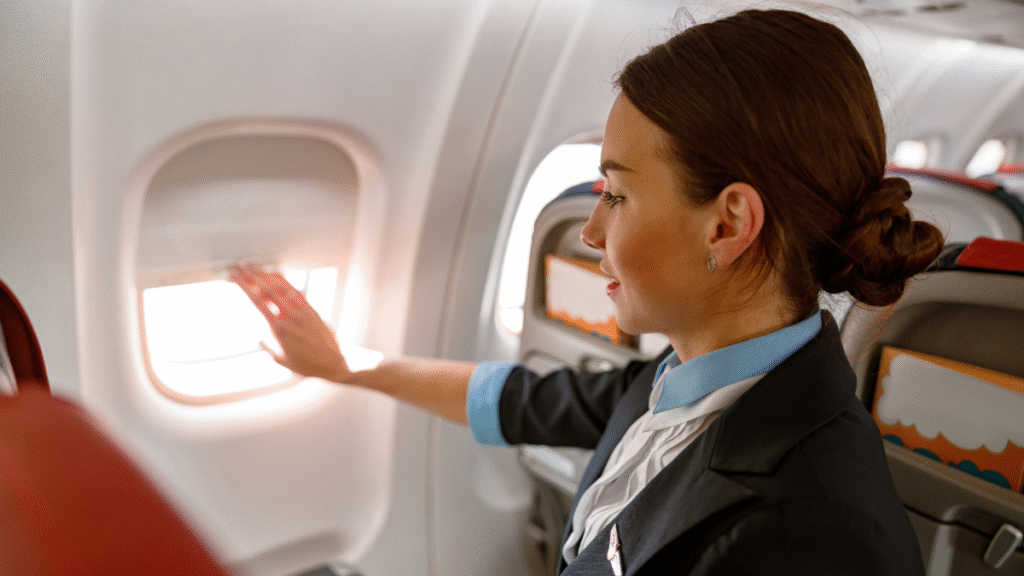One of the most common questions future cabin crew ask is: “How much do flight attendants earn in different countries?” The truth is, cabin crew salaries vary widely depending on the airline, region, seniority, contract type, and flight routes. From entry-level positions at budget carriers to senior roles at premium international airlines, pay scales can range from modest to highly competitive. This lack of clarity often leads to confusion and unrealistic expectations. That’s why I’ve created this global salary guide for flight attendants. If you’re applying to Emirates, Ryanair, Delta, or IndiGo, you’ll find transparent, up-to-date insights into average pay, travel perks, and the factors that shape your earnings, no matter where you’re based.
This article offers real-world data, regional comparisons, and practical advice to help you navigate your aviation journey.

What Makes Up a Flight Attendant's Salary?
What exactly goes into a flight attendant’s paycheck? Indeed, it’s far more than just an hourly wage. A flight attendant’s income is a combination of several key components that can add up significantly, and understanding them is crucial for anyone considering the career. And you’re here to know as much as possible.
Here’s a clear breakdown of the different parts of a flight attendant's salary:
- Base Salary – This is the foundational pay. Think of it as your guaranteed income, either as a monthly salary or an hourly rate. For new hires, this is often the smallest part of their total earnings. It provides stability, but the real money is in the flying.
- Flight Pay / Hourly Rate – This is the core of a flight attendant’s earnings. It’s the hourly wage you get paid while the aircraft doors are closed for departure until they open at the destination. The more flight hours you log, the higher your monthly paycheck will be.
- Per Diem – What is per diem pay for flight attendants? Per diem (Latin for “per day”) is a tax-free allowance to cover expenses like meals and incidentals during layovers away from your home base. It’s paid for every hour you are on duty and away from base, and it can add a significant amount to your total earnings, especially on long-haul or international trips.
- Bonuses and Incentives – Many airlines offer additional compensation to reward their crew. This can include:
- Performance Bonuses: Incentives for excellent customer service or punctuality.
- Profit-Sharing: A share of the company’s profits, often paid out annually.
- Language Pay: An extra hourly rate for flight attendants who are fluent in a specific language needed for certain international routes.
- Position Pay: A higher rate for senior roles, such as a Purser or Cabin Manager.
- Ground Pay / Boarding Pay: In the past, many airlines didn’t pay for the time flight attendants spent on the ground. However, some airlines—especially major carriers in the U.S. and Canada—now offer a special hourly rate for the time spent on board before departure and after arrival, providing a crucial addition to overall earnings.
For a quick summary, think of it this way:
Base Salary, Guaranteed income, Paid regardless of hours flown
Flight Pay Hourly wage Paid from door to door o
Per Diem Expense allowance, paid for hours away from home basepen
Bonuses, extra earnings, based on performance, seniority, and skills

A Global Look at Flight Attendant Salaries for the 5 Top Airlines
Here’s a comparison of estimated salaries and benefits at five of the world’s most popular airlines, looking at different markets and career paths.
Emirates $40,000 – $65,000 Free accommodation in Dubai, transport to and from work, medical insurance, and generous flight benefits. Expat contract, tax-free salary in a popular international hub.
Delta Air Lines $35,000 – $80,000+ Profit sharing, 401(k) plan, medical/dental/life insurance, flight benefits for employees and family. Hourly pay increases with seniority. Highly competitive and unionized environment.
British Airways $30,000 – $70,000+ Competitive salary with flight-based pay, pension scheme, staff travel benefits, and private health care options. Pay varies by cabin crew fleet (e.g., Worldwide vs. Mixed Fleet).
Qantas $35,000 – $60,000+ (AUD)Superannuation (retirement fund), flight travel discounts for staff, family, and friends, and annual leave.Base pay and hourly flying allowances for domestic and international routes.
Air Canada $30,000 – $55,000+ (CAD): Flight pass benefits, pension plan, comprehensive medical/dental/vision coverage. Salary increases with seniority and a unionized workforce.
Important Note:
The values in this table are estimates and can vary significantly based on your specific contract, number of hours flown, and the country’s economic conditions. They are meant to provide a general idea of the earning potential.

Key Factors That Impact Your Flight Attendant Paycheck
Your salary as a flight attendant it’s a flexible figure shaped by key variables like airline, location, experience, and flight hours. By understanding what drives these changes, you’ll be better equipped to negotiate your contract, forecast your earnings, and make strategic decisions about your career path.
Experience and Seniority
Your first few years as a flight attendant usually come with a lower starting salary. However, with time, your earnings can climb significantly. After just a few years, your pay could increase by 20-30% or more as you gain seniority and move into higher-level roles like Purser or Cabin Manager.
Contract Type
A direct contract with a major carrier (like Delta, Qantas, or British Airways) generally offers more stability, comprehensive benefits, and a higher salary compared to a contract through a third-party agency, which is often seen in the low-cost carrier market.
Routes and Destinations
This is a major factor in your earning potential. Flying on long-haul, international, or intercontinental routes is far more lucrative. Why? More flight hours mean more flight pay, and longer layovers lead to higher per diem allowances.
Cabin Class
The part of the plane you work in can also affect your pay. Flight attendants assigned to Business or First Class may receive additional performance bonuses or a higher base rate due to the increased level of service required.
Home Base Location
Where you are based can directly impact your earnings and living expenses. For example, airlines in the Middle East often provide free furnished accommodation to offset high living costs in cities like Dubai or Doha. In contrast, a US-based flight attendant might need to factor in high rent in cities like New York or Los Angeles.
Languages and Special Skills
You get ongoing training to stay current on safety and service protocols. Many airlines also have clear pathways for internal growth, offering opportunities to become a trainer, supervisor, or move into management.

Flight Attendant Benefits You Didn’t Know About
While salary is a key consideration, a flight attendant’s total compensation package includes incredibly valuable non-monetary benefits. These perks can truly define your quality of life.
- Unrivaled Travel Benefits: This is the most famous perk. Flight attendants and their families can get deeply discounted or even free flights. This allows you to explore the globe, often flying standby on a “space available” basis.
- Accommodation & Layovers: For international crews, many airlines (like Emirates and Qatar Airways) provide shared apartments or a housing allowance. During layovers, the airline covers the cost of hotels, freeing you from a major travel expense.
- Health & Wellness: Most established airlines offer comprehensive benefits packages, including medical, dental, and life insurance. These are crucial for a job that involves irregular hours and frequent travel.
- Continuous Training & Career Progression: You get ongoing training to stay current on safety and service protocols. Many airlines also have clear pathways for internal growth, offering opportunities to become a trainer, supervisor, or move into management.
A career as a flight attendant is far from a typical 9-to-5 job. It demands a high level of physical and mental adaptability to handle varying schedules, long hours, and constant time zone changes. But for those with a passion for travel and customer service, the lifestyle and rewards can be unmatched.
My Advice for Aspiring Cabin Crew
When you’re considering this career, look beyond just the numbers. While the salary is a key factor, a smart decision requires you to evaluate the entire package.
Here’s my best advice to you:
- Evaluate the Whole Picture: Consider the work-life balance, the full range of benefits, and the long-term opportunities for growth.
- Be Flexible: This is not a 9-to-5 job. Be prepared for a schedule that includes nights, weekends, and holidays. Flexibility is essential for success.
- Focus on Service: The core of this job is hospitality and safety. If you have a passion for helping people, a positive attitude, and the ability to handle stressful situations with grace, you’re already on the right track.
- Think Globally: If you dream of flying for a major international carrier like Emirates or British Airways, be ready for the adventure of living abroad and adapting to a new culture. It’s challenging but can be incredibly rewarding.
Ultimately, a career as a flight attendant is wonderful! With the right skills and a strategic mindset, you can build a stable and fulfilling career, based at home or across the globe.